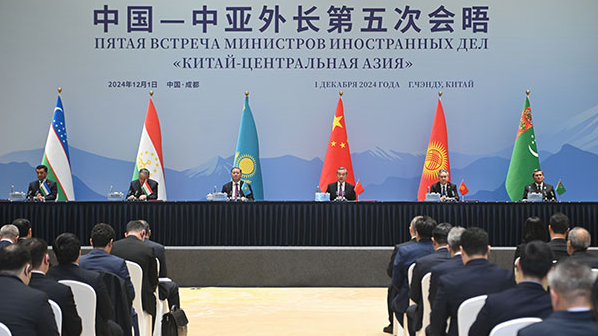
 0 Comment(s)
0 Comment(s) Print
Print E-mail Xinhua, December 2, 2024
E-mail Xinhua, December 2, 2024

The 5th China-Central Asia Foreign Ministers' Meeting is held in Chengdu City, southwest China's Sichuan province, December 1, 2024. [Photo/Chinese Foreign Ministry]
The Fifth China-Central Asia Foreign Ministers' Meeting, held on Sunday in southwestern Chinese city of Chengdu, saw extensive discussions among the foreign ministers on comprehensively advancing cooperation and making political preparations for the second China-Central Asia Summit scheduled for next year.
Chinese Foreign Minister Wang Yi, also a member of the Political Bureau of the Communist Party of China Central Committee, chaired the meeting. Attendees included Kazakhstan's Deputy Prime Minister and Minister of Foreign Affairs Murat Nurtleu, Kyrgyzstan's Minister of Foreign Affairs Kulubaev Zheenbek Moldokanovich, Tajikistan's Minister of Foreign Affairs Sirojiddin Muhriddin, Turkmenistan's Deputy Prime Minister and Foreign Minister Rashid Meredov, and Uzbekistan's Foreign Minister Bakhtiyor Saidov.
Wang noted that the China-Central Asia Mechanism has been in place for four years, during which the six countries, driven by good neighborliness, solidarity and pragmatism, have worked together to promote its development.
He said that significant progress has been made since the first summit in Xi'an last May, with over half of the relevant projects being implemented or making substantial progress.
The two sides have established ministerial platforms in areas such as trade, customs, agriculture, transportation, and industrial investment, Wang said, adding that China is willing to enhance cooperation with Central Asian countries and align development strategies.
Speaking at the meeting, the foreign ministers of the five Central Asian countries noted that based on the principles of equality and mutual respect, China and Central Asia enjoy a high level of mutual trust and extensive cooperation, establishing an exemplary model of relations among neighboring countries.
According to the ministers, the Central Asian countries express their support for China's cooperation proposals and their willingness to collaborate on the Belt and Road Initiative, strengthen law enforcement and security cooperation, and jointly build a China-Central Asia community with a shared future. They also voiced support for China's rotating presidency of the Shanghai Cooperation Organization.
The six foreign ministers agreed on establishing a themed cooperation year every two years to foster high-quality development in China-Central Asia relations.
After the meeting, Wang summarized the outcomes and consensus in a joint press conference with the five Central Asian countries' foreign ministers.
Wang emphasized the importance of the guidance by the heads of state in ensuring the success of the summit in Kazakhstan next year.
He said that China and Central Asian countries will start drafting a summit joint declaration, an action plan for high-quality Belt and Road cooperation, a permanent good-neighborliness and cooperation treaty, and agreements in other significant areas.
To achieve modernization and deepen cooperation on all fronts, Wang said that the six countries should focus on six priority areas, namely, trade facilitation, industrial investment, connectivity, green mining, agricultural modernization, and streamlined people-to-people exchanges.
China is ready to expand cooperation with Central Asia in BeiDou Navigation Satellite System applications, poverty reduction and alleviation, desertification control, higher education, and cultural exchange, Wang said.
He also stressed maintaining regional peace and security, noting that the six countries agreed to jointly combat terrorism, separatism, and extremism, firmly oppose external interference in Central Asian countries' internal affairs and creating chaos and turbulence in Central Asia, and support Afghanistan in achieving peace and reconstruction.
China and Central Asian countries should enhance mutual learning among civilizations and the sharing of governance experiences, said Wang, adding that over the next three years, China will provide 1,500 training opportunities and 600 scholarships for Central Asian countries.
In promoting multilateralism, Wang said that the six countries pledged to uphold multilateralism and international fairness and justice.
He said the six countries should continue to strengthen coordination in global affairs, solidarity and cooperation among the Global South to promote an equal and orderly multi-polar world and economic globalization that benefits all.
China and Central Asian countries reaffirmed their commitment to preserving peace and security and defending the outcomes of World War II, Wang said.
On Sunday, the foreign ministers also attended the launching ceremony of the "Tianfu" cross-border freight truck service to Central Asia.
The transport service now connects 20 cities across five Central Asian countries. Plans are underway to expand the service to cover major Central Asian cities within three years.
Additionally, the ministers inaugurated a China-Central Asia center for the exhibition and promotion of commodities, which features national pavilions for the five Central Asian countries to showcase and promote their products.
The center will serve as a new platform for collaboration in trade, education, culture, and tourism between China and Central Asia.
Go to Forum >>0 Comment(s)